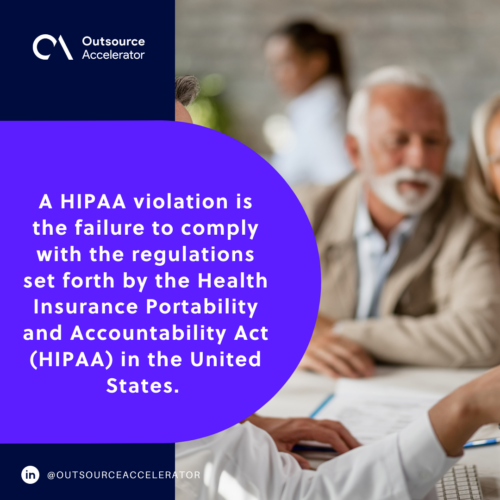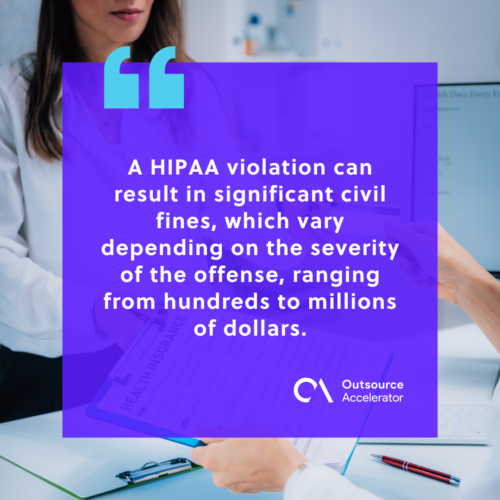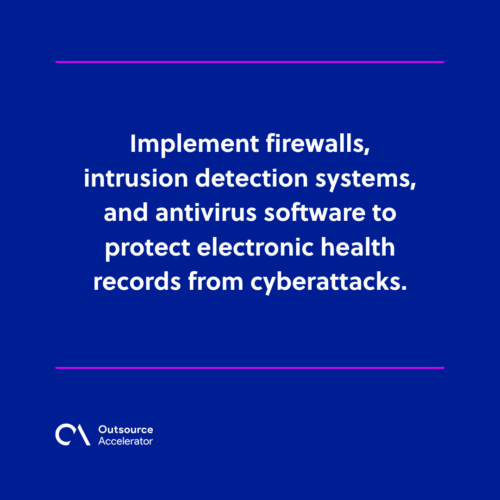Dissecting a HIPAA violation

Technology is revolutionizing the healthcare industry, so safeguarding sensitive patient information has become paramount.
The Health Insurance Portability and Accountability Act (HIPAA) was established in 1996 to protect the privacy and security of individuals’ healthcare data. The act imposes stringent regulations on healthcare providers, insurers, and other entities.
However, despite the robust framework, healthcare organizations continue to grapple with the risk of a HIPAA violation, whether accidental or intentional. These offenses come with severe consequences.
This article looks at the intricate web of a HIPAA violation, the potential implications of non-compliance, and how to maintain data privacy in the digital healthcare space.
What is a HIPAA violation?
A HIPAA violation is the failure to comply with the regulations set forth by the Health Insurance Portability and Accountability Act (HIPAA) in the United States.
It encompasses various actions that result in:
- Unapproved access, use, or disclosure of Protected Health Information (PHI)
- Lack of safeguards to protect PHI
- Insufficient employee training on HIPAA rules
- Failure to provide patients with access to their PHI
- Other breaches of HIPAA requirements
The consequences of a HIPAA violation can be significant. They may result in civil and criminal penalties, including fines, sanctions, and potentially imprisonment.
To mitigate the risk of HIPAA violations, organizations handling Protected Health Information (PHI) should invest in robust security measures and implement HIPAA-compliant tools.
These tools play a crucial role in ensuring the approved access, use, and disclosure of PHI, as well as in providing adequate safeguards and employee training to adhere to HIPAA regulations.

Common examples of a HIPAA violation
HIPAA violations can be in various forms like the following:
Unauthorized access to disclosure
This occurs when healthcare employees access or disclose protected health information without proper authorization. For example, employees may snoop on the records of family, friends, co-workers, or even celebrities.
Insufficient safeguards
A HIPAA violation may result from failing to implement appropriate security measures to protect PHI. This may include not implementing access controls, encryption, or having inadequate physical security measures.
Lack of patient consent or authorization
HIPAA requires covered entities to obtain patient consent or authorization for certain uses and PHI disclosures. A HIPAA violation occurs when PHI is used without the necessary approval.
Improper disposal of PHI
Failing to properly dispose of PHI can result in a HIPAA violation.
Examples include throwing away PHI without shredding or securely disposing of physical documents. On the digital side, this can mean not properly wiping or destroying electronic devices that contain PHI.
Inadequate employee training
Covered entities are required to provide comprehensive training to employees to ensure HIPAA compliance.
A HIPAA violation can occur when employees are not properly trained on policies, leading to accidental or intentional PHI breaches.
Breach notification failures
If a data breach of unsecured PHI occurs, covered entities must promptly notify affected individuals, the Department of Health and Human Services, and, in some cases, the media.
Failure to provide timely and proper breach notifications can result in a HIPAA violation.
Implications of a HIPAA violation
The implications of a HIPAA violation can have far-reaching consequences.
Legal consequences
A HIPAA violation can result in significant civil fines, which vary depending on the severity of the offense, ranging from hundreds to millions of dollars.
Additionally, intentional or willful violations can lead to criminal charges, including potential imprisonment.

Financial repercussions
Aside from substantial fines and associated legal fees, organizations that violate HIPAA regulations may be required to compensate affected individuals.
Reputational damage
A HIPAA violation can erode patient trust and damage the reputations of healthcare organizations. Patients may be reluctant to seek treatment from a center with a history of data breaches.
High-profile breaches can attract media coverage, further harming reputation.
Loss of professional licenses
Healthcare professionals who knowingly violate HIPAA may face disciplinary actions. This can include the suspension or revocation of their professional licenses.
Long-term consequences
The impact of a HIPAA violation can extend long after the initial breach, affecting an organization’s ability to grow, innovate, and maintain patient trust.
10 ways to prevent a HIPAA violation
Preventing HIPAA violations requires a combination of comprehensive policies, robust training, technical safeguards, and a culture of privacy awareness within healthcare organizations.
Here are steps to help prevent HIPAA violations:
1. Develop comprehensive policies and procedures
Create clear, detailed policies and procedures addressing data security, patient privacy, and employee responsibilities.
Outline guidelines for handling electronic health records (EHRs), physical records, and patient communications.
2. Regular training and education
Provide ongoing training for all employees on HIPAA regulations, the importance of patient privacy, and the consequences of violations.
Ensure employees understand their roles in safeguarding patient information and know best practices.
3. Implement strong access controls
Enforce strict access controls to limit access to patient records only to authorized personnel who need the information to perform their job duties.
Use role-based access permissions to ensure employees can access only the data relevant to their roles.
4. Encryption and secure transmission
Encrypt electronic patient data during transmission and storage to prevent unauthorized access in case of data breaches. Ensure any communications containing sensitive patient information are encrypted.
5. Physical security measures
Secure physical documents containing patient data in locked cabinets or secure storage areas.
Limit access to areas where patient records are stored and regularly monitor these areas.
6. Secure digital infrastructure
Implement firewalls, intrusion detection systems, and antivirus software to protect electronic health records from cyberattacks.
Keep software and systems up to date with the latest security patches.

7. Incident response plan
Develop an incident response plan to address breaches promptly and effectively if they occur. Train employees on the steps to take in case of a breach, including reporting procedures.
8. Third-party vendor management
Ensure third-party vendors and business associates who handle patient data comply with HIPAA regulations. This can be solved by outsourcing through experienced firms.
Establish clear contracts outlining their responsibilities for data security.
9. Privacy awareness culture
Foster a culture of privacy awareness and accountability among employees. Encourage reporting of potential security risks or breaches without fear of retaliation.
10. Regular risk assessments
Conduct regular risk assessments to identify vulnerabilities in data security and privacy practices. Address any weaknesses or gaps found during these assessments.
By taking a proactive and holistic approach to HIPAA compliance, healthcare organizations can significantly reduce the risk of violations and safeguard patient privacy and data security.







 Independent
Independent




